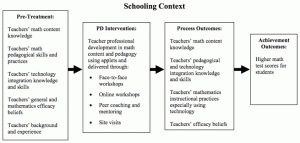Professional Development Adds Up for Maine’s Math Teachers
New research shows that high-quality professional development can make a difference with test scores.
Your content has been saved!
Go to My Saved Content.Professional development is the essential vitamin for boosting learning with laptops, according to researchers studying Maine's one-to-one program. David Silvernail, director of the Center for Education Policy, Applied Research, and Evaluation, said a two-year randomized control trial of middle school math teachers was "successful on all fronts."
Researchers examined the impact of high quality, ongoing professional development that included face-to-face and online workshops, peer coaching and mentoring, and site visits.

In the end, it was a daily double of improvement for both teachers and students in the experimental group. Both tested significantly higher in math knowledge than peers in the control group, even though teachers all started at the same level.
For students, the opening bar was fairly low across the board. In 2002, the year the laptop program began, 79 percent of 8th grade students failed to meet the state's mathematics standard, and only 1 percent scored at the highest level of proficiency.

Based on their review of several other studies, Silvernail, and co-author Pam Buffington, created this list of what goes into high-quality professional development.
Effective Professional Development:
- focuses on the curriculum standards for students and the alignment of teaching, curriculum, and assessment with those standards;
- fosters a deepening of subject-matter knowledge, a greater understanding of learning, and a greater appreciation of students' needs;
- centers around the critical activities of teaching and learning – planning lessons, evaluating student work, developing curriculum, improving classroom practices, and increasing student learning -- rather than in abstractions and generalities;
- builds on investigations of practice through cases that involve specific problems of practice, questions, analysis, reflection, and substantial professional discourse;
- values and cultivates a culture of collegiality, involving knowledge, and experience-sharing among educators;
- is sustained, intensive, and continuously woven into the everyday fabric of the teaching profession, through modeling, coaching, and collaborations; and,
- begins with the mathematics content goals and effective teaching methods, rather than with the technology (when technology is employed).
More Information on the Math Study and Maine's Laptop Program:
- Expeditionary Learning Schools - Evidence of Success: What the Research Shows
- Maine International Center for Digital Learning - Research links
- Maine Learning Technology Initiative - Research and Evaluation Reports
- Center for Education Policy, Applied Research, and Evaluation at the University of Southern Maine - Maine Learning Technology Initiative (the original research on Maine's One-to-One laptop program)
- Maine Educational Policy Research Institute
- Maine's Impact Study of Technology in Mathematics (PowerPoint)
- Historical Information and Documents: 2001 Legislative Statute and Task Force Report
What do you think of Schools that Work?
Tweet your answer to @edutopia or post your comment below.